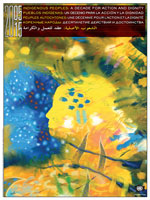|
This Friday, August 9, is the United Nations’ International Day of the World’s Indigenous People. The day has been celebrated every year since 1994, and this year’s theme is “Indigenous People Building Alliances: Honoring Treaties, Agreements, and Other Constructive Arrangements.” As the United Nations says, “the theme aims to highlight the importance of honoring arrangements between States, their citizens andIndigenous peoples that were designed to recognize Indigenous peoples’ rights to their lands and establish a framework for living in proximity and entering into economic relationships. Agreements also outline a political vision of different sovereign peoples living together on the same land according to the principles of friendship, cooperation, and peace.” Celebratory Events To celebrate the day, the United Nations will be holding a special event at their New York City headquarters on Friday, August 9 starting at 3pm, which will be broadcast live. On the same day, hundreds of Indigenous and non-Indigenous rowers are scheduled to arrive at the New York piers in Manhattan. Participants have traveled thousands of miles via canoe and horseback to honor the 400 year anniversary of the signing of the Two Row Wampum Treaty, the first treaty between Dutch immigrants and the Haudensosaunee, the Indigenous inhabitants of New York. Get Involved Cultural Survival, First Peoples Worldwide, and the #Proud2BIndigenous coalition is dedicating the week to FPIC – Free, Prior and Informed Consent, which stipulates that corporations, governments, and NGOS must include Indigenous Peoples in the planning and implementation of all development projects on traditional land, and obtain their consent before beginning a project, including respecting their right to say no to such projects. |
From Cultural Survival :
|
On Friday, August 9 at 11:00AM EST we will be hosting awebinar, along with First Peoples Worldwide and theInternational Indian Treaty Council, entitled “Engaging FPIC: Understanding, Interpretation, and Self-Determination.” Please join us for this online panel discussion followed by a question and answer segment. You can follow the discussion on Twitter using the hashtags #FPIC and #P2BI. Register online here. For more information on Free, Prior and Informed Consent and to download free radio spots on FPIC, see our materials
|
From the UN website
2013 Theme: “Indigenous peoples building alliances: Honouring treaties, agreements and other constructive arrangements”
The International Day of the World’s Indigenous People (9 August) was first proclaimed by the General Assembly in December 1994, to be celebrated every year during the first International Decade of the World’s Indigenous People (1995 – 2004).
In 2004, the Assembly proclaimed a Second International Decade, from 2005 – 2014, with the theme of “A Decade for Action and Dignity.” The focus of this year’s International Day is “Indigenous peoples building alliances: Honouring treaties, agreements and other constructive arrangements.”
(poster for second decade: http://www.un.org/esa/socdev/unpfii/media/images/decade_poster.pdf)
The theme aims to highlight the importance of honouring arrangements between States, their citizens and indigenous peoples that were designed to recognize indigenous peoples’ rights to their lands and establish a framework for living in proximity and entering into economic relationships. Agreements also outline a political vision of different sovereign peoples living together on the same land, according to the principles of friendship, cooperation and peace.
**
Resources and links for further information and research
Fact Sheets
- Climate change and indigeous peoples

- Indigenous Peoples – Lands, Territories and Natural Resources

- Peoples: Development with Culture and Identity Articles 3 and 32 of the UN Declaration on the Rights of Indigenous Peoples

- Declaration on the Rights of Indigenous Peoples

- Indigenous Languages

- Indigenous Peoples of North America

- Indigenous Peoples and Forests

- Advances in the Recognition of Indigenous Rights since the Adoption of the UN Declaration
- Indigenous Peoples And Industrial Corporations

- Indigenous Peoples in the Arctic Region

- Urban Indigenous Peoples and Migration

- Indigenous Peoples in the Pacific Region

Other Documents
- Documents and Publications
- Guidelines on Indigenous Peoples’ Issues – United Nations Development Group

- Special “UN Buzz” by the UN Regional Information Centre for Western Europe (UNRIC)
Related Links
- Indigenous Women
- Indigenous Children and Youth
- Climate Change and Indigenous Peoples
- Indigenous People and Agricultural Development
- Indigenous People and the Environment
- Trust Fund on Indigenous Issues relating to the Second International Decade of the World’s Indigenous People
Through a grant from the International Fund for Agricultural Development (IFAD), the Secretariat of the UN Permanent Forum has been able to initiate training programmes to government agencies, indigenous peoples’ organizations, and UN System staff at country level. The aim of the training programmes is to improving the situation of indigenous peoples at country level through capacity building and awareness raising on indigenous peoples’ issues. For further information please contact the Secretariat atindigenous_un@un.org
Training Materials

Training Module on Indigenous Peoples’ Issues
[EN][ES] [FR]
Resource Kit on Indigenous Peoples’ Issues
[EN] [ES] [FR]
Materials and Programmes from Countries Where Training Has Been Held
Turin (Italy)–Training of Trainers


